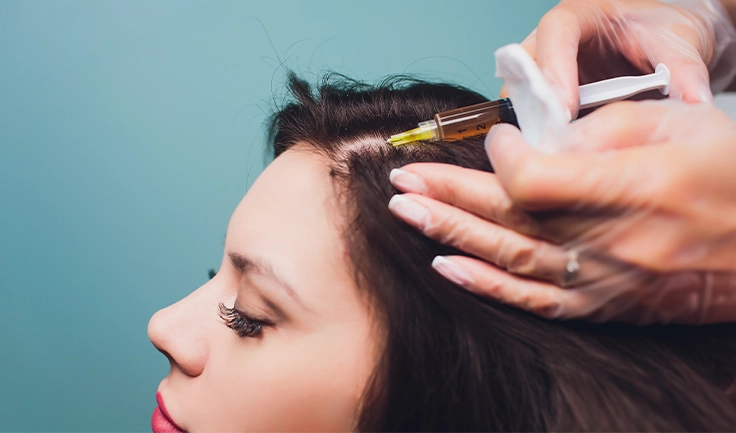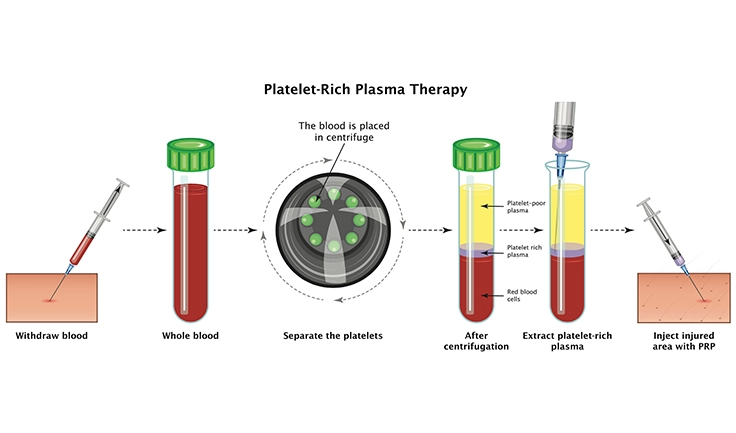What Type of Hair Loss Benefits From PRP Injection?
Do you look in the mirror and notice your thinning hairline?
If so, you're not alone. Hair loss affects millions of people, with over 80 million experiencing
some form of it. As you search for solutions, you may have encountered various treatments, including
medications like Rogaine™and Propecia®. While these are commonly used, they aren't suitable for everyone.
Prefer platelet-rich plasma (PRP) therapy, a safe and natural alternative that could answer your hair
restoration needs.
What is Platelet-Rich Plasma (PRP) Therapy?
Platelets in PRP contain proteins that help to speed up tissue healing and
regeneration in idle hair follicles. These platelets include several internal structures,
including glycogen (a type of glucose), lysosomes (which break down proteins), and alpha
granules (which carry clotting and growth hormones that are released during cell healing).
Platelet-rich plasma-derived growth factors can also play a role in stem cell differentiation
during musculoskeletal wound healing.
- PRP therapy Involves a simple three-step process
- Blood Collection A small sample of your blood is drawn.
- Centrifugation This sample is spun in a centrifuge, separating
the components to concentrate the plasma rich in platelets.
- Injection The PRP is injected into your scalp, targeting areas where hair is thinning or lost.
This therapy utilizes your growth factors—proteins that signal cells to grow and repair themselves. With PRP, you can potentially restore hair density and promote healthier locks.
Types of Hair Loss Responsive to PRP Therapy
PRP therapy is especially effective for specific types of hair loss.
Knowing these types can help determine if this treatment is proper for you.
Androgenic Alopecia Treatment for Pattern Hair Loss
Androgenic alopecia, commonly known as male or female pattern baldness, is the
most prevalent form of hair loss. In men, it typically manifests as a receding hairline and thinning
at the crown. For women, the hair often becomes thinner on the top of the head while the hairline remains
intact. Research shows that PRP therapy can improve hair density, thickness, and overall hair count in
individuals suffering from androgenic alopecia.
Alopecia Areata Treatment for Kids and Adults
Alopecia areata is an autoimmune condition where the body attacks its hair follicles,
resulting in sudden hair loss in patches. This condition affects people of all ages but is particularly
common among children and young adults. Studies indicate that PRP may be more effective than traditional
treatments, such as minoxidil, in managing alopecia areata.
Early Hair Loss Treatment for Hormone Changes in Female
Research suggests that individuals experiencing early stages of hair loss are the best
candidates for PRP therapy. If your hair begins to thin, starting PRP treatment promptly
can help strengthen existing hair follicles and promote new growth. The earlier you begin
treatment, the more likely you will achieve positive results.
Benefits of PRP Therapy in Hair Growth/ Rejuvenation
Platelets in PRP contain proteins for tissue healing and regeneration in inactive hair follicles.
- Intracellular structures include glycogen, lysosomes, and alpha granules.
- Platelet-rich plasma-derived growth factors aid in stem cell differentiation
in wound-healing of the musculoskeletal system.
- PRP-specific cells cause hair growth: Factor (PDGF), Vascular Endothelial
Growth Factor (VEGF), Transforming Growth-Factor-Beta (TGF-b), Epidermal Growth Factor (EGF), Fibroblast Growth Factor-2 (FGF-2),
and Insulin-Like Growth Factor-1 (IGF-1).
- PRP is a modern procedure used in medicine, cosmetic facial treatment, and hair restoration.

How Effective is Platelet-rich plasma (PRP) Therapy?
The effectiveness of PRP therapy can vary based on several factors, including the type and stage of hair loss.
Studies have consistently shown that PRP can improve hair density and thickness in patients suffering from both
androgenetic alopecia and non-scarring alopecia areata.
A study published that after four sessions of PRP therapy, patients
exhibited remarkable improvements in hair density and overall growth.
Additionally, a comparative study indicated that PRP is more effective
than conventional treatments like Rogaine, particularly for early-stage hair loss.
Safety and Side Effects of PRP Therapy
PRP therapy is generally considered safe, mainly since it uses your own blood,
minimizing the risk of allergic reactions. However, potential side effects can include
mild pain, redness, and swelling at the injection site, typically resolving within a
few days. To ensure safety, it's crucial that the procedure is performed in a sterile
environment by a qualified medical professional.
Suitable Candidates for PRP Therapy
Not everyone is an ideal candidate for PRP therapy. Those with large areas of
baldness or underlying health issues, such as thyroid disorders, may find this treatment
less effective. It's essential to consult with a qualified dermatologist to assess your
unique situation and explore the best treatment options.
Why Choose PRP Therapy at Keva Skin and Hair Care Clinic?
If you're struggling with hair loss,
PRP therapy at Keva Skin and Hair Care Clinic (PRP Therapy)
could be the solution you've been looking for. With minimal invasiveness and proven effectiveness,
PRP therapy offers a promising avenue for those seeking to restore their hair and confidence.
Keva Skin and Hair Care Clinic in Coimbatore
Specializes in PRP hair treatments, offering personalized solutions
for hair loss. Our experienced professionals are dedicated to helping you regain your confidence through effective and safe
treatments. By choosing Keva, you will receive a tailored treatment plan that meets your specific needs.























